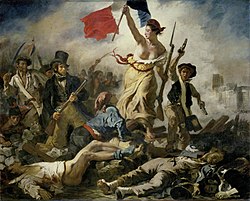Revolutionary: Difference between revisions
→Revolution and ideology: this needs to be cited from a secondary RS with appropriate context |
Undid revision 811442606 by My very best wishes (talk) |
||
| Line 15: | Line 15: | ||
<blockquote> |
<blockquote> |
||
"The revolutionary is a doomed man. He has no private interests, no affairs, sentiments, ties, property nor even a name of his own. His entire being is devoured by one purpose, one thought, one passion - the revolution. Heart and soul, not merely by word but by deed, he has severed every link with the social order and with the entire civilized world; with the laws, good manners, conventions, and morality of that world. He is its merciless enemy and continues to inhabit it with only one purpose - to destroy it."<ref>[http://www.spartacus.schoolnet.co.uk/RUSnechayev.htm Nechayev], Spartacus Educational website by John Simkin</ref><ref>[[Sergey Nechayev]] (1869). [https://www.marxists.org/subject/anarchism/nechayev/catechism.htm The Revolutionary Catechism].</ref></blockquote> |
"The revolutionary is a doomed man. He has no private interests, no affairs, sentiments, ties, property nor even a name of his own. His entire being is devoured by one purpose, one thought, one passion - the revolution. Heart and soul, not merely by word but by deed, he has severed every link with the social order and with the entire civilized world; with the laws, good manners, conventions, and morality of that world. He is its merciless enemy and continues to inhabit it with only one purpose - to destroy it."<ref>[http://www.spartacus.schoolnet.co.uk/RUSnechayev.htm Nechayev], Spartacus Educational website by John Simkin</ref><ref>[[Sergey Nechayev]] (1869). [https://www.marxists.org/subject/anarchism/nechayev/catechism.htm The Revolutionary Catechism].</ref></blockquote> |
||
[[Marxist]] revolutionary [[Che Guevara]] said this about revolutionaries: "At the risk of seeming ridiculous, let me say that the true revolutionary is guided by a great feeling of love.... We must strive every day so that this love of living humanity will be transformed into actual deeds, into acts that serve as examples, as a moving force."<ref>[http://www.marxists.org/archive/guevara/1965/03/man-socialism.htm "Socialism and Man in Cuba"] A letter to [[Carlos Quijano]], editor of ''[[Marcha (newspaper)|Marcha]]'', a weekly newspaper published in Montevideo, Uruguay; published as "From Algiers, for Marcha: The Cuban Revolution Today" by [[Che Guevara]] on March 12, 1965</ref><ref>https://www.marxists.org/archive/guevara/1965/03/man-socialism.htm</ref> |
|||
==See also== |
==See also== |
||
Revision as of 17:49, 21 November 2017
| Part of a series on |
| Political revolution |
|---|
 |
|
|
A revolutionary is a person who either participates in, or advocates revolution.[1] Also, when used as an adjective, the term revolutionary refers to something that has a major, sudden impact on society or on some aspect of human endeavor.
Definition
The term —both as a noun and adjective— is usually applied to the field of politics, and is occasionally used in the context of science, invention or art. In politics, a revolutionary is someone who supports abrupt, rapid, and drastic change, while a reformist is someone who supports more gradual and incremental change. A conservative is someone who generally opposes such changes. A reactionary is someone who wants things to go back to the way they were before the change has happened.
Revolution and ideology
According to sociologist James Chowning Davies, political revolutionaries may be classified in two ways:
- According to the goals of the revolution they propose. Usually, these goals are part of a certain ideology. In theory, each ideology could generate its own brand of revolutionaries. In practice, most political revolutionaries have been either anarchists, communists, democrats, Islamists, nationalists, republicans, or socialists.
- According to the methods they propose to use. This divides revolutionaries in two broad groups: Those who advocate a violent revolution, and those who are pacifists.
The revolutionary anarchists Mikhail Bakunin and Sergey Nechayev argued in Catechism of a Revolutionary:
"The revolutionary is a doomed man. He has no private interests, no affairs, sentiments, ties, property nor even a name of his own. His entire being is devoured by one purpose, one thought, one passion - the revolution. Heart and soul, not merely by word but by deed, he has severed every link with the social order and with the entire civilized world; with the laws, good manners, conventions, and morality of that world. He is its merciless enemy and continues to inhabit it with only one purpose - to destroy it."[2][3]
Marxist revolutionary Che Guevara said this about revolutionaries: "At the risk of seeming ridiculous, let me say that the true revolutionary is guided by a great feeling of love.... We must strive every day so that this love of living humanity will be transformed into actual deeds, into acts that serve as examples, as a moving force."[4][5]
See also
- American Revolution
- Armchair revolutionary
- Counter-revolutionary
- Counterculture of the 1960s
- Cuban Revolution
- Cultural Revolution
- French Revolution
- Iranian Revolution
- Professional revolutionaries (Leninism)
- Revolutionary movement
- Russian Revolution
- Revolutionary socialism
- Revolutionary song
- Revolutionary terror
- Revolutionary wave
- World revolution
- Revolutionary movement for Indian independence
- Xinhai Revolution
References
- ^ "ARD
- ^ Nechayev, Spartacus Educational website by John Simkin
- ^ Sergey Nechayev (1869). The Revolutionary Catechism.
- ^ "Socialism and Man in Cuba" A letter to Carlos Quijano, editor of Marcha, a weekly newspaper published in Montevideo, Uruguay; published as "From Algiers, for Marcha: The Cuban Revolution Today" by Che Guevara on March 12, 1965
- ^ https://www.marxists.org/archive/guevara/1965/03/man-socialism.htm
External links
- Castro: Revolutionary as Celebrity - slideshow by LIFE magazine
